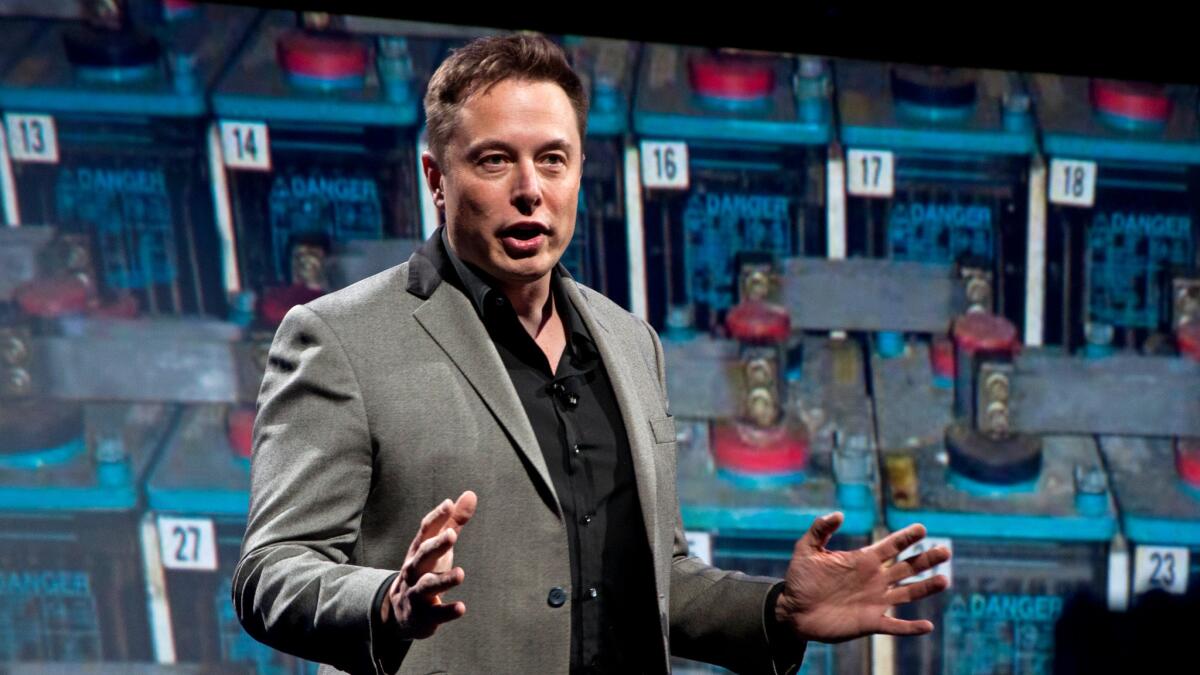Tesla’s bid for SolarCity would bring two Elon Musk companies together

Tesla Motors Inc. has offered to buy SolarCity Corp., a $2.8-billion deal that would unite two Bay Area companies funded and driven by Los Angeles billionaire Elon Musk.
If a deal for the struggling rooftop solar giant is approved, Tesla would become more than just an electric car maker, evolving into an increasingly diverse company with interests across a range of green technologies.
For the record:
11:42 a.m. June 22, 2016An earlier version of this article stated that SolarCity’s stock has plummeted about 35% in the past year. It is down 63% from a year ago.
“The world does not look for another car company, the world looks for sustainable energy companies,” Musk told reporters and analysts in a call Tuesday.
The combination would allow customers to generate solar power from Tesla rooftop installations, store the energy in Tesla batteries and transfer the energy into Tesla electric cars.
“It’s now time to complete the picture,” Tesla said in a blog post. “Tesla customers can drive clean cars and they can use our battery packs to help consume energy more efficiently, but they still need access to the most sustainable energy source that’s available: the sun.”
One of the biggest rooftop solar companies in the United States, SolarCity sells or leases its system to homeowners, the U.S. military and big businesses including Intel, Walgreens and Wal-Mart. SolarCity did not respond to requests for comment.
Under the proposal, Tesla would acquire outstanding shares of SolarCity in exchange for Tesla common shares at a value of $26.50 to $28.50 per share, a 21% to 30% premium over SolarCity’s Tuesday closing price but far below its 52-week high of $61.72.
The Tesla board said its intention is to “proceed only on a friendly basis.”
The two companies already are on unusually friendly terms. Musk is chairman of SolarCity and owns 22% of the company; at Tesla, he is chairman and chief executive and owns 21%, according to the latest FactSet figures. He is the top shareholder of both.
In 2006, he helped found SolarCity with his cousins, Lyndon and Peter Rive, respectively SolarCity’s CEO and chief technology officer. (Their mothers are twins.)
The offer is just the latest instance of Musk trying to boost the fortunes of one company by using one of his other companies or his own money. His SpaceX firm has bought bonds backed by SolarCity’s rooftop panel sales, for instance.
Stock analysts and investors will be picking over the details of Tuesday’s proposed stock swap — a more complicated undertaking than a straight cash deal.
Robert McCullough of Portland, Ore.-based McCullough Research questioned Musk’s offer, saying he thought it was a “very strange choice for him. I was a little surprised.”
McCullough said it appeared that Musk was doubling down on solar at a time when the economics of solar installations has been called into question. Solar, he said, has become so cheap that it’s becoming difficult to make money, as the industry learned with SunEdison, which went bankrupt in April.
“These guys are victims of their own success,” McCullough said.
Now the question is whether Musk is buying in at the wrong time, he said.
But Karl Brauer, an auto analyst at Kelley Blue Book, said “Overall, the deal makes sense. There is a lot of shared purpose between the two.”
The companies already are engaged in several partnership deals. For example, Tesla makes battery packs for SolarCity installations, while SolarCity provides solar panels for Tesla’s network of car-charging stations. Tesla is building a so-called gigafactory in Nevada to make Powerwall battery packs for homes and business; the facility will have substantial competition from rival battery makers when it gets off the ground.
Analysts have suggested that the battery business could one day rival Tesla’s car business in revenue. While he is optimistic, Brauer sees challenges ahead: Neither company is profitable, and the electric car industry and solar energy are reliant on government subsidies and incentives.
But there are upsides to officially bringing the two companies together.
Company mergers often fail to meet expectations when different corporate cultures don’t gel, but given the current close relationship, “the question of culture clash is kind of a nonissue,” Brauer said.
And as solar companies such as Solyndra went under, SolarCity grew strong. Tesla, meanwhile, surprised the entire automobile industry by designing and manufacturing electric cars that sparked enthusiastic customer demand.
“Culturally, this is a great fit,” Tesla said in its blog post. “Both companies are driven by a mission of sustainability, innovation, and overcoming any challenges that stand in the way of progress.”
The proposed deal is subject to the completion of due diligence as well as approval of a majority of “disinterested stockholders” — not including Musk or Valor Equity Partners founder Antonio Gracias, who is a board member at both Tesla and Solar City.
Tesla said it would become the only company offering “end-to-end” clean energy products to customers.
The automaker unveiled a line of inexpensive residential and commercial battery-based systems in April 2015. At the time, Musk said he envisioned off-the-grid homes and businesses and remote villages powered by solar.
SolarCity has been incorporating more of Tesla’s battery storage systems in its solar installations.
In Hawaii, SolarCity is offering homeowners the equivalent of cutting the cord when it comes to electricity with packages that include solar panels, battery storage and smart technology. The offer is to allow customers to separate from their electric company or go “off the grid.”
Lyndon Rive has said he expects to make similar offers to homeowners on the U.S. mainland in the next five years or so.
But SolarCity has been under pressure. Despite increasing its number of installations, the company has seen its stock plummet about 63% in the last year.
The San Mateo, Calif., company has increasingly faced resistance to its business model from regulators and utilities in Nevada and Arizona. In December, for instance, SolarCity announced that it would cease operations in Nevada after regulators drastically cut benefits to rooftop solar owners.
Utility companies argue that rooftop solar owners do not pay their fair share of the cost for the poles, wires and substations that make up the electric grid. Utilities have pressed regulators in states nationwide to increase fees on rooftop solar owners and to decrease the amount paid for electricity that solar owners produce.
Regulators in California, by far the nation’s leader in use of solar power, have continued to support benefits for rooftop solar owners.
SolarCity shares soared 23% in after-hours trading after closing at $21.19 in Tuesday’s regular session. Tesla shares fell sharply after hours, down 10%, after closing at $219.61.
MORE FROM BUSINESS
Twitter and Vine loosen limits, trying to hold on to users
PG&E to close Diablo Canyon, California’s last nuclear power plant
Trader Joe’s agrees to cut greenhouse gas emissions in court settlement
UPDATES:
3:43 p.m. This article was updated with additional information.
3:18 p.m.: This article was updated with additional information.
This article was originally published at 2:45 p.m.








